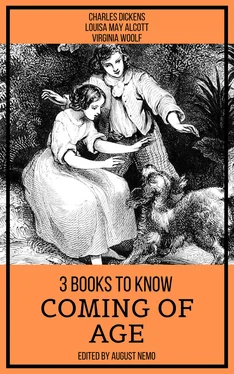Mr. Jaggers suddenly became most irate. "Now, I warned you before," said he, throwing his forefinger at the terrified client, "that if you ever presumed to talk in that way here, I'd make an example of you. You infernal scoundrel, how dare you tell ME that?"
The client looked scared, but bewildered too, as if he were unconscious what he had done.
"Spooney!" said the clerk, in a low voice, giving him a stir with his elbow. "Soft Head! Need you say it face to face?"
"Now, I ask you, you blundering booby," said my guardian, very sternly, "once more and for the last time, what the man you have brought here is prepared to swear?"
Mike looked hard at my guardian, as if he were trying to learn a lesson from his face, and slowly replied, "Ayther to character, or to having been in his company and never left him all the night in question."
"Now, be careful. In what station of life is this man?"
Mike looked at his cap, and looked at the floor, and looked at the ceiling, and looked at the clerk, and even looked at me, before beginning to reply in a nervous manner, "We've dressed him up like—" when my guardian blustered out:
"What? You WILL, will you?"
("Spooney!" added the clerk again, with another stir.)
After some helpless casting about, Mike brightened and began again:
"He is dressed like a 'spectable pieman. A sort of a pastry-cook."
"Is he here?" asked my guardian.
"I left him," said Mike, "a settin on some doorsteps round the corner."
"Take him past that window, and let me see him."
The window indicated, was the office window. We all three went to it, behind the wire blind, and presently saw the client go by in an accidental manner, with a murderous-looking tall individual, in a short suit of white linen and a paper cap. This guileless confectioner was not by any means sober, and had a black eye in the green stage of recovery, which was painted over.
"Tell him to take his witness away directly," said my guardian to the clerk, in extreme disgust, "and ask him what he means by bringing such a fellow as that."
My guardian then took me into his own room, and while he lunched, standing, from a sandwich-box and a pocket flask of sherry (he seemed to bully his very sandwich as he ate it), informed me what arrangements he had made for me. I was to go to "Barnard's Inn," to young Mr. Pocket's rooms, where a bed had been sent in for my accommodation; I was to remain with young Mr. Pocket until Monday; on Monday I was to go with him to his father's house on a visit, that I might try how I liked it. Also, I was told what my allowance was to be—it was a very liberal one—and had handed to me from one of my guardian's drawers, the cards of certain tradesmen with whom I was to deal for all kinds of clothes, and such other things as I could in reason want. "You will find your credit good, Mr. Pip," said my guardian, whose flask of sherry smelt like a whole cask-full, as he hastily refreshed himself, "but I shall by this means be able to check your bills, and to pull you up if I find you outrunning the constable. Of course you'll go wrong somehow, but that's no fault of mine."
After I had pondered a little over this encouraging sentiment, I asked Mr. Jaggers if I could send for a coach? He said it was not worth while, I was so near my destination; Wemmick should walk round with me, if I pleased.
I then found that Wemmick was the clerk in the next room. Another clerk was rung down from up-stairs to take his place while he was out, and I accompanied him into the street, after shaking hands with my guardian. We found a new set of people lingering outside, but Wemmick made a way among them by saying coolly yet decisively, "I tell you it's no use; he won't have a word to say to one of you;" and we soon got clear of them, and went on side by side.
 |
|
 |

Casting my eyes on Mr. Wemmick as we went along, to see what he was like in the light of day, I found him to be a dry man, rather short in stature, with a square wooden face, whose expression seemed to have been imperfectly chipped out with a dull-edged chisel. There were some marks in it that might have been dimples, if the material had been softer and the instrument finer, but which, as it was, were only dints. The chisel had made three or four of these attempts at embellishment over his nose, but had given them up without an effort to smooth them off. I judged him to be a bachelor from the frayed condition of his linen, and he appeared to have sustained a good many bereavements; for, he wore at least four mourning rings, besides a brooch representing a lady and a weeping willow at a tomb with an urn on it. I noticed, too, that several rings and seals hung at his watch chain, as if he were quite laden with remembrances of departed friends. He had glittering eyes—small, keen, and black—and thin wide mottled lips. He had had them, to the best of my belief, from forty to fifty years.
"So you were never in London before?" said Mr. Wemmick to me.
"No," said I.
"I was new here once," said Mr. Wemmick. "Rum to think of now!"
"You are well acquainted with it now?"
"Why, yes," said Mr. Wemmick. "I know the moves of it."
"Is it a very wicked place?" I asked, more for the sake of saying something than for information.
"You may get cheated, robbed, and murdered, in London. But there are plenty of people anywhere, who'll do that for you."
"If there is bad blood between you and them," said I, to soften it off a little.
"Oh! I don't know about bad blood," returned Mr. Wemmick; "there's not much bad blood about. They'll do it, if there's anything to be got by it."
"That makes it worse."
"You think so?" returned Mr. Wemmick. "Much about the same, I should say."
He wore his hat on the back of his head, and looked straight before him: walking in a self-contained way as if there were nothing in the streets to claim his attention. His mouth was such a postoffice of a mouth that he had a mechanical appearance of smiling. We had got to the top of Holborn Hill before I knew that it was merely a mechanical appearance, and that he was not smiling at all.
"Do you know where Mr. Matthew Pocket lives?" I asked Mr. Wemmick.
"Yes," said he, nodding in the direction. "At Hammersmith, west of London."
"Is that far?"
"Well! Say five miles."
"Do you know him?"
"Why, you're a regular cross-examiner!" said Mr. Wemmick, looking at me with an approving air. "Yes, I know him. I know him!"
There was an air of toleration or depreciation about his utterance of these words, that rather depressed me; and I was still looking sideways at his block of a face in search of any encouraging note to the text, when he said here we were at Barnard's Inn. My depression was not alleviated by the announcement, for, I had supposed that establishment to be an hotel kept by Mr. Barnard, to which the Blue Boar in our town was a mere public-house. Whereas I now found Barnard to be a disembodied spirit, or a fiction, and his inn the dingiest collection of shabby buildings ever squeezed together in a rank corner as a club for Tom-cats.
We entered this haven through a wicket-gate, and were disgorged by an introductory passage into a melancholy little square that looked to me like a flat burying-ground. I thought it had the most dismal trees in it, and the most dismal sparrows, and the most dismal cats, and the most dismal houses (in number half a dozen or so), that I had ever seen. I thought the windows of the sets of chambers into which those houses were divided, were in every stage of dilapidated blind and curtain, crippled flower-pot, cracked glass, dusty decay, and miserable makeshift; while To Let To Let To Let, glared at me from empty rooms, as if no new wretches ever came there, and the vengeance of the soul of Barnard were being slowly appeased by the gradual suicide of the present occupants and their unholy interment under the gravel. A frouzy mourning of soot and smoke attired this forlorn creation of Barnard, and it had strewn ashes on its head, and was undergoing penance and humiliation as a mere dust-hole. Thus far my sense of sight; while dry rot and wet rot and all the silent rots that rot in neglected roof and cellar—rot of rat and mouse and bug and coaching-stables near at hand besides—addressed themselves faintly to my sense of smell, and moaned, "Try Barnard's Mixture."
Читать дальше















